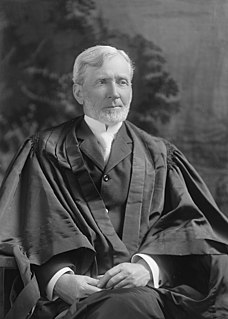
The First Amendment to the United States Constitution prevents the government from making laws which regulate an establishment of religion, or that would prohibit the free exercise of religion, or abridge the freedom of speech, the freedom of the press, the freedom of assembly, or the right to petition the government for redress of grievances. It was adopted on December 15, 1791, as one of the ten amendments that constitute the Bill of Rights.

The Eighth Amendment to the United States Constitution prohibits the federal government from imposing excessive bail, excessive fines, or cruel and unusual punishments. This amendment was adopted on December 15, 1791, along with the rest of the United States Bill of Rights. The Amendment serves as a limitation upon the federal government to impose unduly harsh penalties on criminal defendants before and after a conviction. This limitation applies equally to the price for obtaining pretrial release and the punishment for crime after conviction. The phrases in this amendment originated in the English Bill of Rights of 1689.

Joseph McKenna was an American politician who served in all three branches of the U.S. federal government, as a member of the U.S. House of Representatives, as U.S. Attorney General and as an Associate Justice of the Supreme Court. He is one of seventeen members of the House of Representatives who subsequently served on the Supreme Court.
The Free Exercise Clause accompanies the Establishment Clause of the First Amendment to the United States Constitution. The Establishment Clause and the Free Exercise Clause together read:
Congress shall make no law respecting an establishment of religion, or prohibiting the free exercise thereof...
In United States law, ineffective assistance of counsel (IAC) is a claim raised by a convicted criminal defendant asserting that the defendant's legal counsel performed so ineffectively that it deprived the defendant of the constitutional right guaranteed by the Assistance of Counsel Clause of the Sixth Amendment to the United States Constitution. Ineffectiveness claims may only be brought where the defendant had the right to counsel, ordinarily during the critical stages of a prosecution.
Illinois v. Rodriguez, 497 U.S. 177 (1990), is a U.S. Supreme Court case dealing with the issue of whether a warrantless search conducted pursuant to third party consent violates the Fourth Amendment when the third party does not actually possess common authority over the premises.
Clearfield Trust Co. v. United States, 318 U.S. 363 (1943), was a case in which the Supreme Court of the United States held that federal negotiable instruments were governed by federal law, and thus the federal court had the authority to fashion a common law rule.
Gompers v. Buck's Stove and Range Co., 221 U.S. 418 (1911), was a ruling by the United States Supreme Court involving a case of contempt for violating the terms of an injunction restraining labor union leaders from a boycott or from publishing any statement that there was or had been a boycott.
Continental Paper Bag Co. v. Eastern Paper Bag Co., 210 U.S. 405 (1908), was a case in which the Supreme Court of the United States established the principle that patent holders have no obligation to use their patent.
Saudi Arabia v. Nelson, 507 U.S. 349 (1993), is a United States Supreme Court case in which the Court considered the term "based upon a commercial activity" within the meaning of the first clause of 1605(a)(2) of the Foreign Sovereign Immunities Act of 1976.
Rosen v. United States, 161 U.S. 29 (1896), was a case decided by the United States Supreme Court dealing with the concept of obscenity. In a decision written by Justice Harlan, the Court upheld the conviction of the defendant to 13 months hard labor and a fine of $1 for allegedly using the United States Postal Service to send material that was deemed "obscene, lewd and lascivious".
United States v. Olano, 507 U.S. 725 (1993), was a United States Supreme Court case that distinguished between forfeiture and waiver. Quoting from Johnson v. Zerbst, 304 U.S. 458 (1938), the Court noted, "Whereas forfeiture is the failure to make the timely assertion of a right, waiver is the "intentional relinquishment or abandonment of a known right.... Whether a particular right is waivable; whether the defendant must participate personally in the waiver; whether certain procedures are required for waiver; and whether the defendant's choice must be particularly informed or voluntary, all depend on the right at stake."
Withrow v. Williams, 507 U.S. 680 (1993), was a United States Supreme Court case in which the Court held that Fifth Amendment Miranda v. Arizona arguments can be raised again in federal habeas corpus proceedings, even if a criminal defendant had a fair chance to argue those claims in state court. The Court rejected the state's argument that Stone v. Powell, a case holding the opposite in the context of Fourth Amendment claims on habeas review, applied in Williams' case.
Cincinnati v. Discovery Network, Inc., 507 U.S. 410 (1993), was a case in which the Supreme Court of the United States held that a ban by the city of Cincinnati on the distribution of commercial material via news racks violated the First Amendment.
In the United States, all states have passed laws that restrict age discrimination, and age discrimination is restricted under federal laws such as the Age Discrimination in Employment Act of 1967 (ADEA).

The Anti-Injunction Act, is a United States federal statute that restricts a federal court's authority to issue an injunction against ongoing state court proceedings, subject to three enumerated exceptions. It states:
Austin v. United States, 509 U.S. 602 (1993), was a case in which the Supreme Court of the United States held that the Eighth Amendment to the United States Constitution applies to civil forfeiture cases.
Gompers v. United States, 233 U.S. 604 (1914), was a contempt of court case decided by the Supreme Court of the United States.



